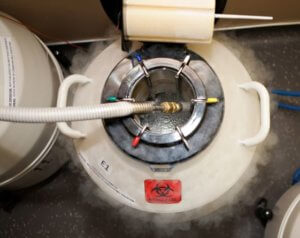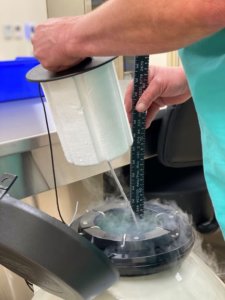Our staff is committed to storage safeguards that protect your genetic material

When you freeze your eggs, sperm or embryos at Fertility Answers, it is understandable that you may have questions about how safe they are while in our care. What happens if the power goes out? What if there is a flood? How do we prevent lab mix-ups so that you don’t get someone else’s genetic material?
These are all good questions and we understand the anxiety patients may feel when placing their most precious and irreplaceable possessions in our trust. But we want to assure you that we understand the responsibility of safeguarding our patients’ genetic material and take this job very seriously. Our lab partner Ovation Fertility who operates our IVF labs, outlines their protocols for keeping your eggs, embryos and sperm safe from harm in our Lafayette and Baton Rouge clinics.
Our IVF labs are subject to federal and state oversight
All IVF laboratories have some level of systems in place to safeguard against an event, such power outages or weather events, that could potentially affect thousands of frozen embryos, sperm and eggs. In the forty years since the birth of the first IVF baby, physicians and IVF laboratory personnel have been devoted to developing systems that both anticipate and prevent any tragedy that could affect stored genetic material. With over 150,000 IVF cycles in over 500 IVF laboratories in the US every year, catastrophic events that actually harm frozen genetic material are extremely rare.
Fertility physicians and IVF laboratory personnel from around the world work together to share best practices for laboratory safety and security. We also work closely with industry to design better storage tanks and early detection systems that can immediately alert us to any potential problem. Additionally, each of our laboratories is certified and licensed by federal and state agencies that regularly review our policies and procedures. As part of this process, IVF laboratories are subjected to regular as well as surprise inspections by CAP, CLIA, and the FDA.
Genetic material is stored in liquid nitrogen cryotanks that don’t need electricity
First of all, it is important to understand how frozen genetic materials are stored. Rather than storing them in freezers that require electricity and are subject to a variety of potential mechanical issues, power outages, and/or unanticipated defrost cycles, our storage safeguards dictate that frozen embryos, eggs and sperm are stored in large insulated tanks surrounded by liquid nitrogen. These cryotanks have an outer layer of stainless steel that surrounds many layers of thick insulation. This insulation is necessary, as liquid nitrogen has a temperature of -321O Fahrenheit. At this temperature, cellular metabolism ceases, which explains why embryos, eggs and sperm can be successfully frozen for many years and can still function normally after they are thawed.

When liquid nitrogen is stored in a cryotank, it actually exists in two forms – liquid and vapor. The liquid layer is at the bottom of the tank, while the vapor is at the top. Even at its normal temperature, liquid nitrogen slowly evaporates. The normal level of evaporation is so slow that, even if we did not add any liquid nitrogen on a regular basis, it would take several weeks for the level to fall below the level where specimens are stored. Regardless, our laboratory personnel perform daily inspections to monitor the temperature and level of the actual liquid form of nitrogen, adding additional nitrogen as necessary, to keep all specimens in the more stable liquid layer.
Due to the multiple layers of regular insulation and vacuum insulation, a catastrophic leak of a cryotank is very unlikely. Regardless, in the unlikely event of a leak, sensors are designed to detect the slightest rise in temperature. These sensors wirelessly transmit information to monitors located in the laboratory as well as to an alarm system. The alarm system is also programmed to call our laboratory personnel immediately, as well as send text and email messages in the event of an alarm, so that they can respond and deal with any problem.
Barcode labeling ensures proper identification of genetic material
Ovation Fertility’s storage safeguards also extend to each unit of genetic material stored. Each sperm, egg, or embryo specimen is clearly labeled with its own unique barcode before being individually stored in thick walled cryo devices that are specially designed to be able to withstand the extreme temperatures inside the cryotanks.
In our Ovation Fertility IVF labs, we use the Matcher electronic witnessing system, a barcode-based witnessing, labeling, workflow scheduling and traceability system. This identification system was specifically created for IVF clinics and donor banks to help prevent errors through misidentification of patients to their gametes and embryos. Despite using verbal checks to ensure patient safety, healthcare staff can make mistakes and the Matcher system gives both staff and patients the peace of mind that there is an electronic system in place to mitigate the risk of human error, and assist with the burden of traceability and compliance.
With this technology, our lab staff labels every patient dish, paperwork, sperm tubes, and cryo storage devices holding genetic material with a barcode specific to each individual patient to ensure that genetic material is properly matched. Patients can rest assured that this added layer of identification storage safeguards will keep their eggs, embryos and sperm securely identifiable.
Long-term storage of genetic material
While we do store embryos, sperm and eggs here at Fertility Answers, it is only for short periods of time. For long term storage, all specimens are sent to a long-term storage site operated by our lab partner, Ovation Fertility. Ovation has built a secured site specifically for long term storage, equipped with state of the art onsite and 24-hour video monitoring. The site is staffed by experienced personnel dedicated to ensuring the safety and security of the embryos.
Fertility Answers and Ovation Fertility want you to be able to rest assured that we have rigorous storage safeguards and procedures in place to protect against any event that may harm your genetic material. We are confident that these safeguards are well designed to minimize any risk to the stored genetic material.


